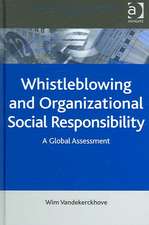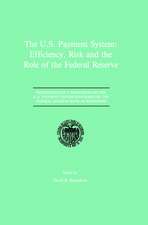Responsible Investment in Times of Turmoil: Issues in Business Ethics, cartea 31
Editat de Wim Vandekerckhove, Jos Leys, Kristian Alm, Bert Scholtens, Silvana Signori, Henry Schäferen Limba Engleză Paperback – 31 ian 2012
Today, one cannot ignore the difficulties of main stream financing. The financial spheres are trembling globally in one of the worst crises since the 1930’s. As a response to the crisis, the intermediation of ‘financial responsibility’ will undoubtedly be the subject of new regulation and scrutinizing. This book looks into what these turbulences will imply for SRI.
In view of these circumstances, one might or even should, ask oneself whether the phenomenon was not an empty fad during the exuberant high of financial euphoria that came abruptly to an end with current financial crises. To put it rather sec: are financial intermediaries that promote ‘sustainability’ credible, while it is obvious that some developments in financial intermediation -predictably, as some say- were unsustainable?
Is this an opportunity for enhancing SRI because of the strength and superiority it has developed or will it disappear due to a return to financial myopia? This book is the first to question the future of SRI in such a radical way.
| Toate formatele și edițiile | Preț | Express |
|---|---|---|
| Paperback (1) | 942.76 lei 6-8 săpt. | |
| SPRINGER NETHERLANDS – 31 ian 2012 | 942.76 lei 6-8 săpt. | |
| Hardback (1) | 948.61 lei 6-8 săpt. | |
| SPRINGER NETHERLANDS – apr 2011 | 948.61 lei 6-8 săpt. |
Din seria Issues in Business Ethics
- 17%
 Preț: 364.75 lei
Preț: 364.75 lei -
 Preț: 420.97 lei
Preț: 420.97 lei - 15%
 Preț: 527.48 lei
Preț: 527.48 lei - 15%
 Preț: 644.63 lei
Preț: 644.63 lei -
 Preț: 385.84 lei
Preț: 385.84 lei - 15%
 Preț: 730.86 lei
Preț: 730.86 lei - 20%
 Preț: 517.11 lei
Preț: 517.11 lei - 15%
 Preț: 598.50 lei
Preț: 598.50 lei - 15%
 Preț: 645.60 lei
Preț: 645.60 lei - 18%
 Preț: 1220.88 lei
Preț: 1220.88 lei - 18%
 Preț: 953.03 lei
Preț: 953.03 lei - 15%
 Preț: 643.99 lei
Preț: 643.99 lei - 15%
 Preț: 644.82 lei
Preț: 644.82 lei - 15%
 Preț: 639.73 lei
Preț: 639.73 lei - 15%
 Preț: 635.96 lei
Preț: 635.96 lei - 20%
 Preț: 558.33 lei
Preț: 558.33 lei - 15%
 Preț: 640.55 lei
Preț: 640.55 lei - 15%
 Preț: 644.49 lei
Preț: 644.49 lei - 18%
 Preț: 772.93 lei
Preț: 772.93 lei - 15%
 Preț: 637.59 lei
Preț: 637.59 lei - 15%
 Preț: 643.99 lei
Preț: 643.99 lei - 15%
 Preț: 644.82 lei
Preț: 644.82 lei - 15%
 Preț: 700.61 lei
Preț: 700.61 lei - 5%
 Preț: 1098.27 lei
Preț: 1098.27 lei - 15%
 Preț: 646.43 lei
Preț: 646.43 lei - 15%
 Preț: 643.99 lei
Preț: 643.99 lei - 18%
 Preț: 952.89 lei
Preț: 952.89 lei - 15%
 Preț: 641.38 lei
Preț: 641.38 lei
Preț: 942.76 lei
Preț vechi: 1149.71 lei
-18% Nou
Puncte Express: 1414
Preț estimativ în valută:
180.40€ • 192.91$ • 150.41£
180.40€ • 192.91$ • 150.41£
Carte tipărită la comandă
Livrare economică 17 aprilie-01 mai
Preluare comenzi: 021 569.72.76
Specificații
ISBN-13: 9789400740709
ISBN-10: 9400740700
Pagini: 260
Ilustrații: XXVI, 234 p.
Dimensiuni: 155 x 235 x 18 mm
Greutate: 0.37 kg
Ediția:2011
Editura: SPRINGER NETHERLANDS
Colecția Springer
Seria Issues in Business Ethics
Locul publicării:Dordrecht, Netherlands
ISBN-10: 9400740700
Pagini: 260
Ilustrații: XXVI, 234 p.
Dimensiuni: 155 x 235 x 18 mm
Greutate: 0.37 kg
Ediția:2011
Editura: SPRINGER NETHERLANDS
Colecția Springer
Seria Issues in Business Ethics
Locul publicării:Dordrecht, Netherlands
Public țintă
ResearchCuprins
Foreword; Alejo José G. Sison.- List of tables.- List of figures.- About the editors.- About the authors.- Introduction; Wim Vandekerckhove, Jos Leys, Kristian Alm, Bert Scholtens, Silvana Signori and Henry Schäfer.- Chapter 1. Global finance and the role of responsible investors; Steve Waddell.- Chapter 2. New values in responsible investment; Neil Eccles.- Chapter 3. The legitimacy of ESG standards as an analytical framework for responsible investment;
Tim Cadman.- Chapter 4. Reputational penalties in financial markets: an ethical mechanism?; Peter-Jan Engelen and Marc van Essen.- Chapter 5. The financial performance of RI funds after 2000; Olaf Weber, Marco Mansfeld and Eric Schirrmann.- Chapter 6. Responsible investment by pension funds after the financial crisis; Riikka Sievänen.- Chapter 7. Private equity as an emerging asset class of responsible investment; Barbara Del Bosco and Nicola Misani.- Chapter 8. Responsible investment and exclusion criteria: a case study from a Catholic Private Bank; Michael S. Aßländer and Markus Schenkel.- Chapter 9. Islamic Banking and responsible investment: is a fusion possible?; Reza Zain Jaufeerally.- Chapter 10. What are your investments doing rightnow?; Joakim Sandberg.- Chapter 11. Sustainability and social justice; Johan A. Klaassen.- Chapter 12.Reality and Potential of responsible investment; Carlos Joly.- Chapter 13. Why responsible investing?; Henrik Syse.- Post scripta – an Owl’s view; Jos Leys, Bert Scholtens, Henry Schäfer, Wim Vandekerckhove, Kristian Alm and Silvana Signori.- Index.
Tim Cadman.- Chapter 4. Reputational penalties in financial markets: an ethical mechanism?; Peter-Jan Engelen and Marc van Essen.- Chapter 5. The financial performance of RI funds after 2000; Olaf Weber, Marco Mansfeld and Eric Schirrmann.- Chapter 6. Responsible investment by pension funds after the financial crisis; Riikka Sievänen.- Chapter 7. Private equity as an emerging asset class of responsible investment; Barbara Del Bosco and Nicola Misani.- Chapter 8. Responsible investment and exclusion criteria: a case study from a Catholic Private Bank; Michael S. Aßländer and Markus Schenkel.- Chapter 9. Islamic Banking and responsible investment: is a fusion possible?; Reza Zain Jaufeerally.- Chapter 10. What are your investments doing rightnow?; Joakim Sandberg.- Chapter 11. Sustainability and social justice; Johan A. Klaassen.- Chapter 12.Reality and Potential of responsible investment; Carlos Joly.- Chapter 13. Why responsible investing?; Henrik Syse.- Post scripta – an Owl’s view; Jos Leys, Bert Scholtens, Henry Schäfer, Wim Vandekerckhove, Kristian Alm and Silvana Signori.- Index.
Textul de pe ultima copertă
The SRI phenomenon is said to be entering the mainstream of financial intermediation. From a fairly marginal practice promoted or campaigned for by NGO’s and at odds with financial practice and orthodoxy it grew into well formulated policy adopted by a wide range of investors. Academic literature on SRI has also boomed on the assumption that mainstreaming is taking place. However, little thinking has been carried out on questions specifically arising from this alleged ‘mainstreaming’. This book, addressed to those with a scholarly or practitioner’s interest in SRI, starts filling this neglected dimension.
Today, one cannot ignore the difficulties of main stream financing. The financial spheres are trembling globally in one of the worst crises since the 1930’s. As a response to the crisis, the intermediation of ‘financial responsibility’ will undoubtedly be the subject of new regulation and scrutinizing. This book looks into what these turbulences will imply for SRI.
In view of these circumstances, one might or even should, ask oneself whether the phenomenon was not an empty fad during the exuberant high of financial euphoria that came abruptly to an end with current financial crises. To put it rather sec: are financial intermediaries that promote ‘sustainability’ credible, while it is obvious that some developments in financial intermediation -predictably, as some say- were unsustainable?
Is this an opportunity for enhancing SRI because of the strength and superiority it has developed or will it disappear due to a return to financial myopia? This book is the first to question the future of SRI in such a radical way.
Today, one cannot ignore the difficulties of main stream financing. The financial spheres are trembling globally in one of the worst crises since the 1930’s. As a response to the crisis, the intermediation of ‘financial responsibility’ will undoubtedly be the subject of new regulation and scrutinizing. This book looks into what these turbulences will imply for SRI.
In view of these circumstances, one might or even should, ask oneself whether the phenomenon was not an empty fad during the exuberant high of financial euphoria that came abruptly to an end with current financial crises. To put it rather sec: are financial intermediaries that promote ‘sustainability’ credible, while it is obvious that some developments in financial intermediation -predictably, as some say- were unsustainable?
Is this an opportunity for enhancing SRI because of the strength and superiority it has developed or will it disappear due to a return to financial myopia? This book is the first to question the future of SRI in such a radical way.
Caracteristici
Scrutinises and reflects on SRI in the context of the current financial crisis Critically assesses different understandings of SRI as these understandings come at play on the market Explicitly tackles epistemological, ethical and policy problems, which will arise or are already arising as mainstreaming SRI faces financial meltdowns























